An Analysis of the Canadian Law on Medical Aid in Dying (MAID)
VerifiedAdded on 2022/08/11
|8
|1859
|38
Essay
AI Summary
This essay delves into the ethical and legal considerations surrounding Medical Aid in Dying (MAID) in Canada, specifically focusing on the justification of Bill C-14, which restricts access to MAID for mentally competent adults suffering from degenerative diseases like Alzheimer's. The paper argues against the bill's restrictions, citing the suffering of terminally ill patients and the importance of respecting their right to choose a peaceful death. It examines the perspectives of nurses, caregivers, and physicians, highlighting the complexities and controversies surrounding MAID, particularly for those with dementia. The essay references various scholarly articles and case studies to support its arguments, emphasizing the need to balance patient autonomy, ethical principles, and legal frameworks in end-of-life care. It concludes that the C-14 bill is unjustified and that mentally incompetent patients should not be denied the right to MAID if they are terminally ill, experiencing immense suffering, and have previously expressed consent while competent.
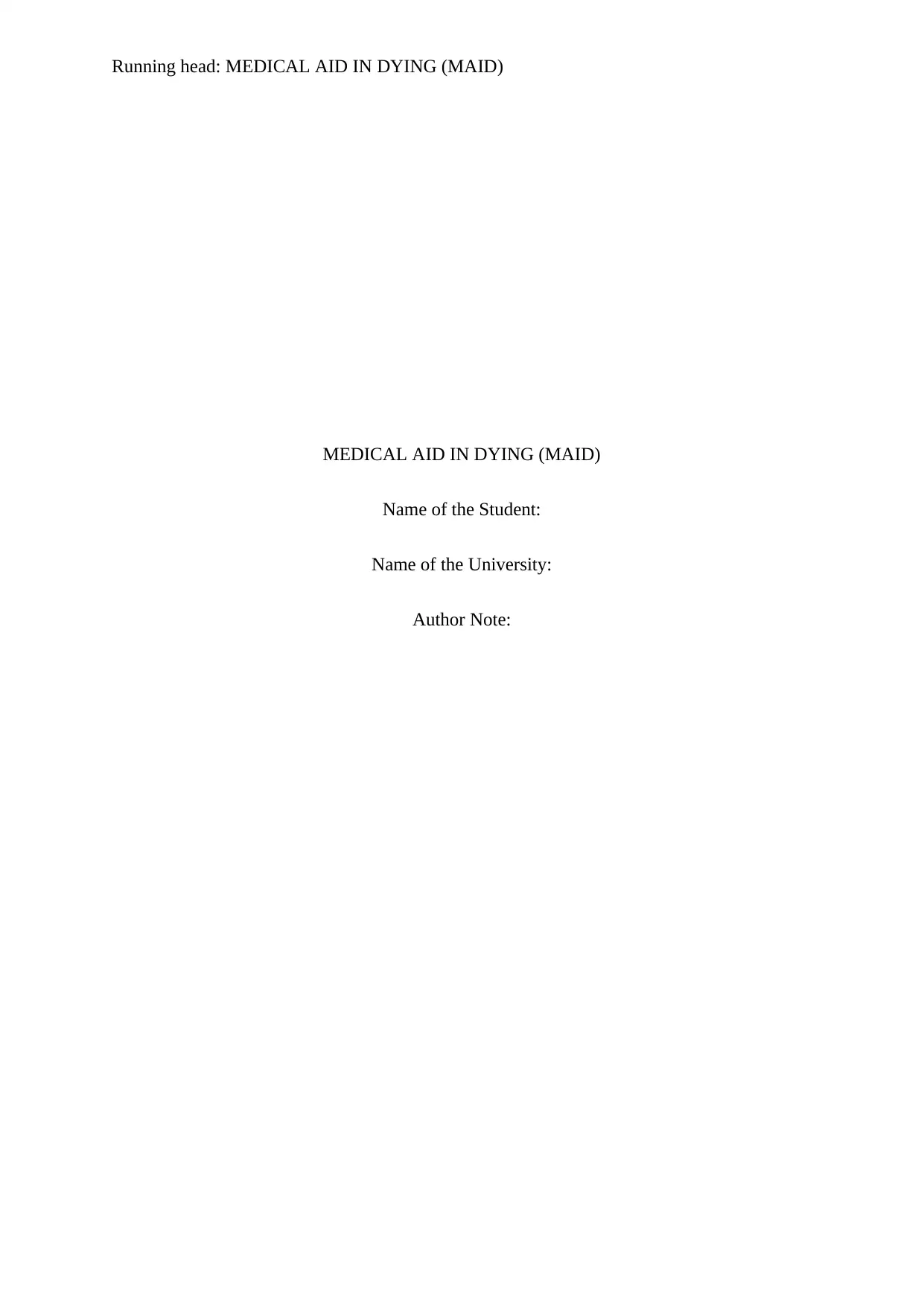
Running head: MEDICAL AID IN DYING (MAID)
MEDICAL AID IN DYING (MAID)
Name of the Student:
Name of the University:
Author Note:
MEDICAL AID IN DYING (MAID)
Name of the Student:
Name of the University:
Author Note:
Paraphrase This Document
Need a fresh take? Get an instant paraphrase of this document with our AI Paraphraser
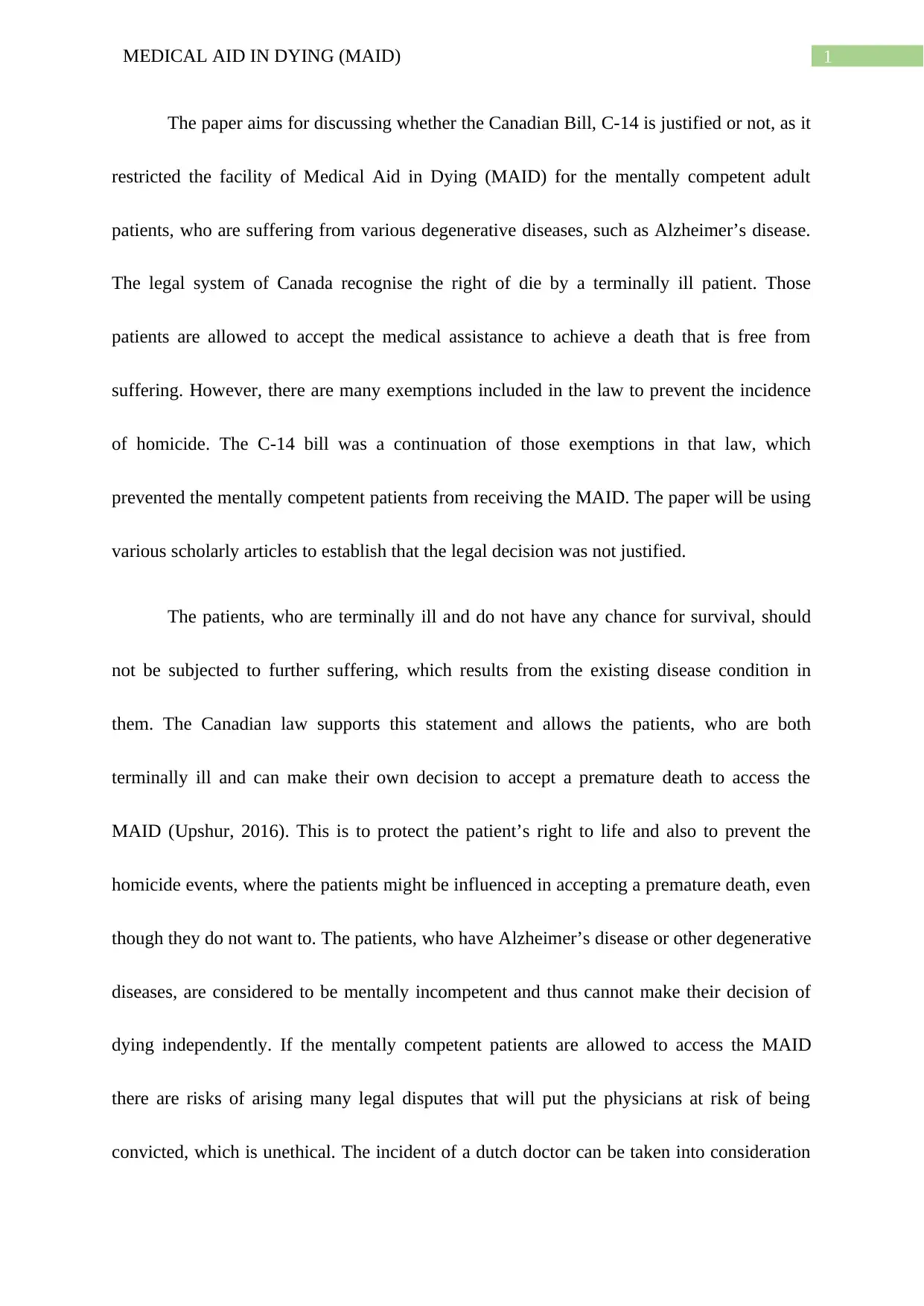
1MEDICAL AID IN DYING (MAID)
The paper aims for discussing whether the Canadian Bill, C-14 is justified or not, as it
restricted the facility of Medical Aid in Dying (MAID) for the mentally competent adult
patients, who are suffering from various degenerative diseases, such as Alzheimer’s disease.
The legal system of Canada recognise the right of die by a terminally ill patient. Those
patients are allowed to accept the medical assistance to achieve a death that is free from
suffering. However, there are many exemptions included in the law to prevent the incidence
of homicide. The C-14 bill was a continuation of those exemptions in that law, which
prevented the mentally competent patients from receiving the MAID. The paper will be using
various scholarly articles to establish that the legal decision was not justified.
The patients, who are terminally ill and do not have any chance for survival, should
not be subjected to further suffering, which results from the existing disease condition in
them. The Canadian law supports this statement and allows the patients, who are both
terminally ill and can make their own decision to accept a premature death to access the
MAID (Upshur, 2016). This is to protect the patient’s right to life and also to prevent the
homicide events, where the patients might be influenced in accepting a premature death, even
though they do not want to. The patients, who have Alzheimer’s disease or other degenerative
diseases, are considered to be mentally incompetent and thus cannot make their decision of
dying independently. If the mentally competent patients are allowed to access the MAID
there are risks of arising many legal disputes that will put the physicians at risk of being
convicted, which is unethical. The incident of a dutch doctor can be taken into consideration
The paper aims for discussing whether the Canadian Bill, C-14 is justified or not, as it
restricted the facility of Medical Aid in Dying (MAID) for the mentally competent adult
patients, who are suffering from various degenerative diseases, such as Alzheimer’s disease.
The legal system of Canada recognise the right of die by a terminally ill patient. Those
patients are allowed to accept the medical assistance to achieve a death that is free from
suffering. However, there are many exemptions included in the law to prevent the incidence
of homicide. The C-14 bill was a continuation of those exemptions in that law, which
prevented the mentally competent patients from receiving the MAID. The paper will be using
various scholarly articles to establish that the legal decision was not justified.
The patients, who are terminally ill and do not have any chance for survival, should
not be subjected to further suffering, which results from the existing disease condition in
them. The Canadian law supports this statement and allows the patients, who are both
terminally ill and can make their own decision to accept a premature death to access the
MAID (Upshur, 2016). This is to protect the patient’s right to life and also to prevent the
homicide events, where the patients might be influenced in accepting a premature death, even
though they do not want to. The patients, who have Alzheimer’s disease or other degenerative
diseases, are considered to be mentally incompetent and thus cannot make their decision of
dying independently. If the mentally competent patients are allowed to access the MAID
there are risks of arising many legal disputes that will put the physicians at risk of being
convicted, which is unethical. The incident of a dutch doctor can be taken into consideration
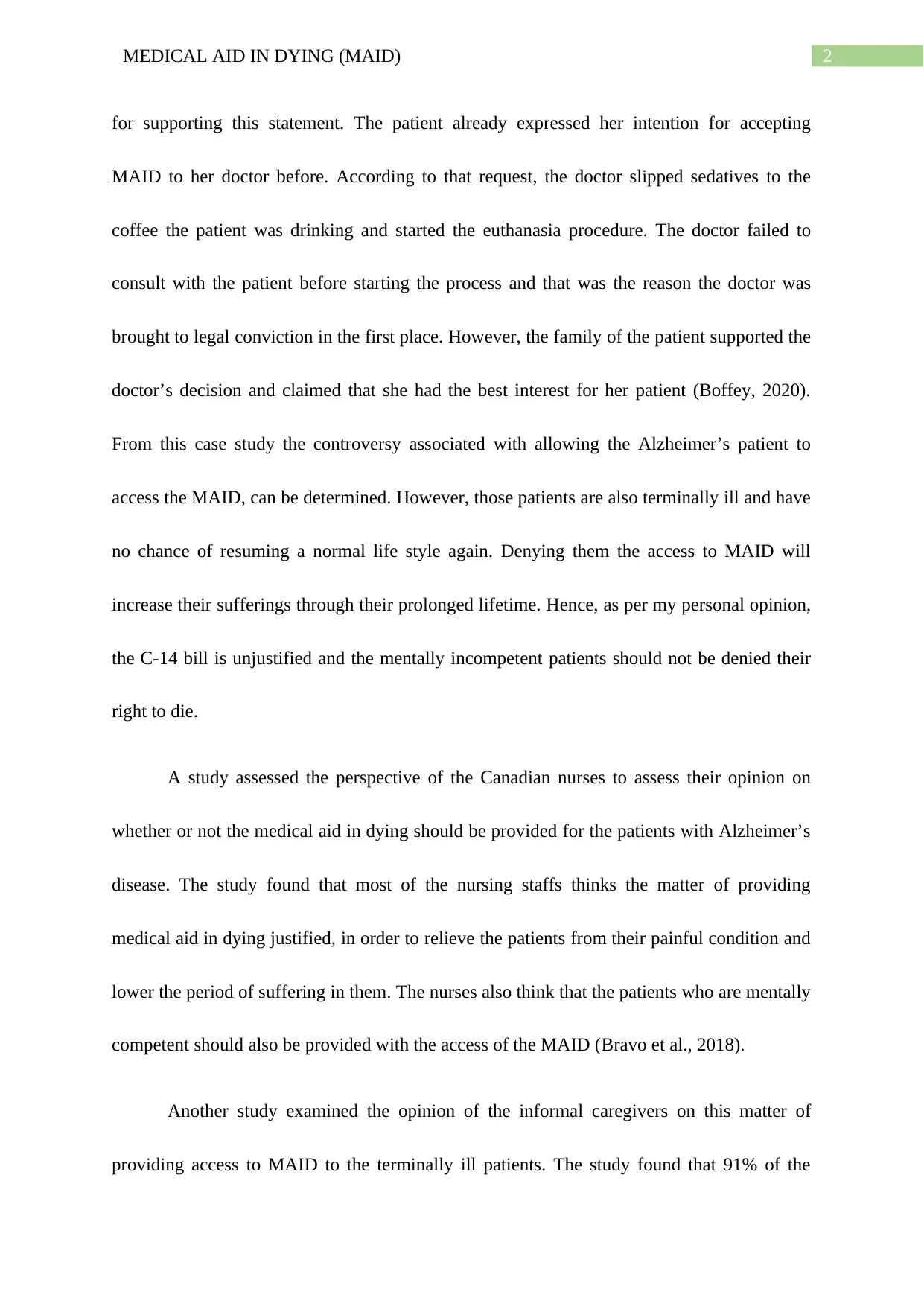
2MEDICAL AID IN DYING (MAID)
for supporting this statement. The patient already expressed her intention for accepting
MAID to her doctor before. According to that request, the doctor slipped sedatives to the
coffee the patient was drinking and started the euthanasia procedure. The doctor failed to
consult with the patient before starting the process and that was the reason the doctor was
brought to legal conviction in the first place. However, the family of the patient supported the
doctor’s decision and claimed that she had the best interest for her patient (Boffey, 2020).
From this case study the controversy associated with allowing the Alzheimer’s patient to
access the MAID, can be determined. However, those patients are also terminally ill and have
no chance of resuming a normal life style again. Denying them the access to MAID will
increase their sufferings through their prolonged lifetime. Hence, as per my personal opinion,
the C-14 bill is unjustified and the mentally incompetent patients should not be denied their
right to die.
A study assessed the perspective of the Canadian nurses to assess their opinion on
whether or not the medical aid in dying should be provided for the patients with Alzheimer’s
disease. The study found that most of the nursing staffs thinks the matter of providing
medical aid in dying justified, in order to relieve the patients from their painful condition and
lower the period of suffering in them. The nurses also think that the patients who are mentally
competent should also be provided with the access of the MAID (Bravo et al., 2018).
Another study examined the opinion of the informal caregivers on this matter of
providing access to MAID to the terminally ill patients. The study found that 91% of the
for supporting this statement. The patient already expressed her intention for accepting
MAID to her doctor before. According to that request, the doctor slipped sedatives to the
coffee the patient was drinking and started the euthanasia procedure. The doctor failed to
consult with the patient before starting the process and that was the reason the doctor was
brought to legal conviction in the first place. However, the family of the patient supported the
doctor’s decision and claimed that she had the best interest for her patient (Boffey, 2020).
From this case study the controversy associated with allowing the Alzheimer’s patient to
access the MAID, can be determined. However, those patients are also terminally ill and have
no chance of resuming a normal life style again. Denying them the access to MAID will
increase their sufferings through their prolonged lifetime. Hence, as per my personal opinion,
the C-14 bill is unjustified and the mentally incompetent patients should not be denied their
right to die.
A study assessed the perspective of the Canadian nurses to assess their opinion on
whether or not the medical aid in dying should be provided for the patients with Alzheimer’s
disease. The study found that most of the nursing staffs thinks the matter of providing
medical aid in dying justified, in order to relieve the patients from their painful condition and
lower the period of suffering in them. The nurses also think that the patients who are mentally
competent should also be provided with the access of the MAID (Bravo et al., 2018).
Another study examined the opinion of the informal caregivers on this matter of
providing access to MAID to the terminally ill patients. The study found that 91% of the
⊘ This is a preview!⊘
Do you want full access?
Subscribe today to unlock all pages.

Trusted by 1+ million students worldwide
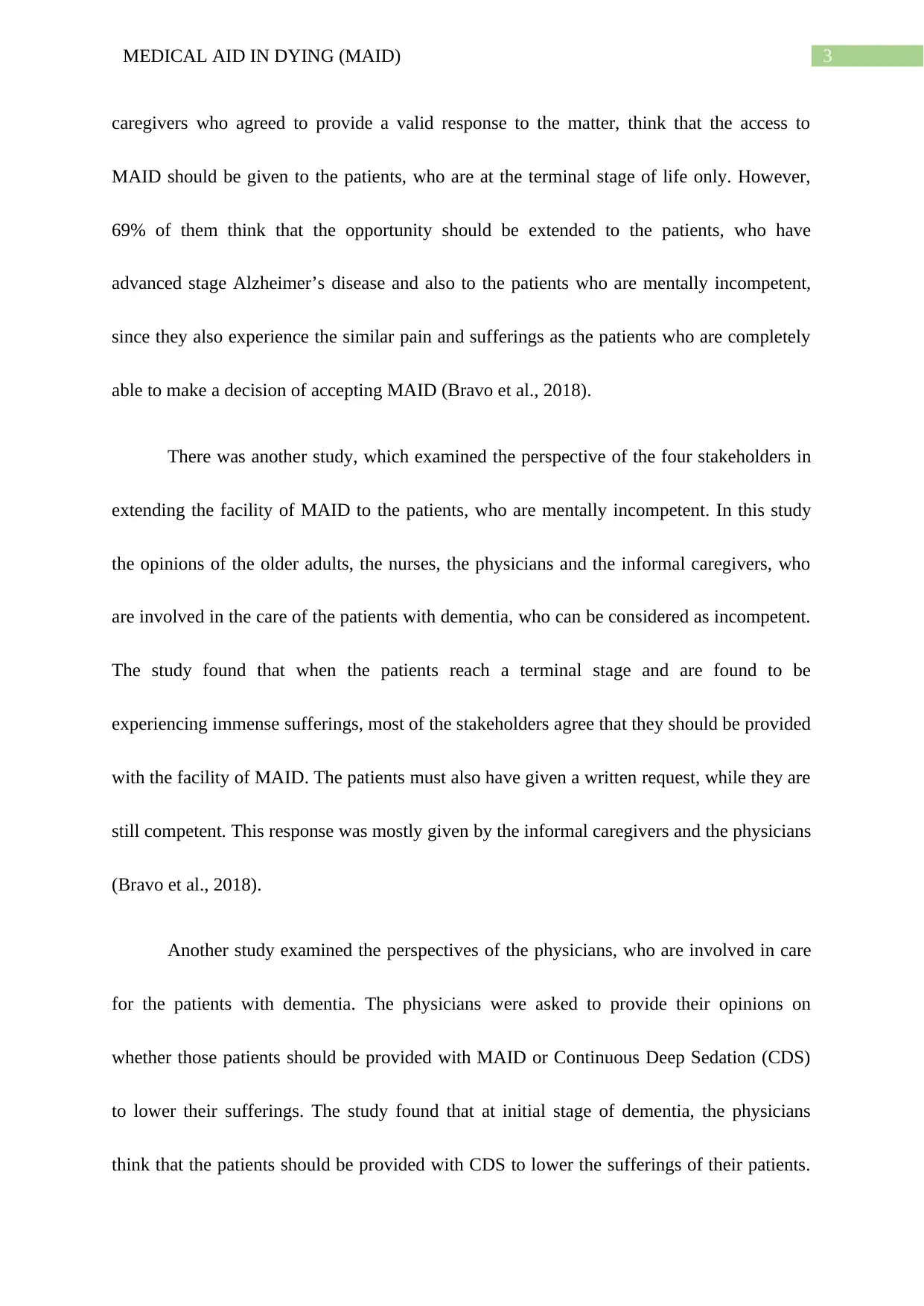
3MEDICAL AID IN DYING (MAID)
caregivers who agreed to provide a valid response to the matter, think that the access to
MAID should be given to the patients, who are at the terminal stage of life only. However,
69% of them think that the opportunity should be extended to the patients, who have
advanced stage Alzheimer’s disease and also to the patients who are mentally incompetent,
since they also experience the similar pain and sufferings as the patients who are completely
able to make a decision of accepting MAID (Bravo et al., 2018).
There was another study, which examined the perspective of the four stakeholders in
extending the facility of MAID to the patients, who are mentally incompetent. In this study
the opinions of the older adults, the nurses, the physicians and the informal caregivers, who
are involved in the care of the patients with dementia, who can be considered as incompetent.
The study found that when the patients reach a terminal stage and are found to be
experiencing immense sufferings, most of the stakeholders agree that they should be provided
with the facility of MAID. The patients must also have given a written request, while they are
still competent. This response was mostly given by the informal caregivers and the physicians
(Bravo et al., 2018).
Another study examined the perspectives of the physicians, who are involved in care
for the patients with dementia. The physicians were asked to provide their opinions on
whether those patients should be provided with MAID or Continuous Deep Sedation (CDS)
to lower their sufferings. The study found that at initial stage of dementia, the physicians
think that the patients should be provided with CDS to lower the sufferings of their patients.
caregivers who agreed to provide a valid response to the matter, think that the access to
MAID should be given to the patients, who are at the terminal stage of life only. However,
69% of them think that the opportunity should be extended to the patients, who have
advanced stage Alzheimer’s disease and also to the patients who are mentally incompetent,
since they also experience the similar pain and sufferings as the patients who are completely
able to make a decision of accepting MAID (Bravo et al., 2018).
There was another study, which examined the perspective of the four stakeholders in
extending the facility of MAID to the patients, who are mentally incompetent. In this study
the opinions of the older adults, the nurses, the physicians and the informal caregivers, who
are involved in the care of the patients with dementia, who can be considered as incompetent.
The study found that when the patients reach a terminal stage and are found to be
experiencing immense sufferings, most of the stakeholders agree that they should be provided
with the facility of MAID. The patients must also have given a written request, while they are
still competent. This response was mostly given by the informal caregivers and the physicians
(Bravo et al., 2018).
Another study examined the perspectives of the physicians, who are involved in care
for the patients with dementia. The physicians were asked to provide their opinions on
whether those patients should be provided with MAID or Continuous Deep Sedation (CDS)
to lower their sufferings. The study found that at initial stage of dementia, the physicians
think that the patients should be provided with CDS to lower the sufferings of their patients.
Paraphrase This Document
Need a fresh take? Get an instant paraphrase of this document with our AI Paraphraser
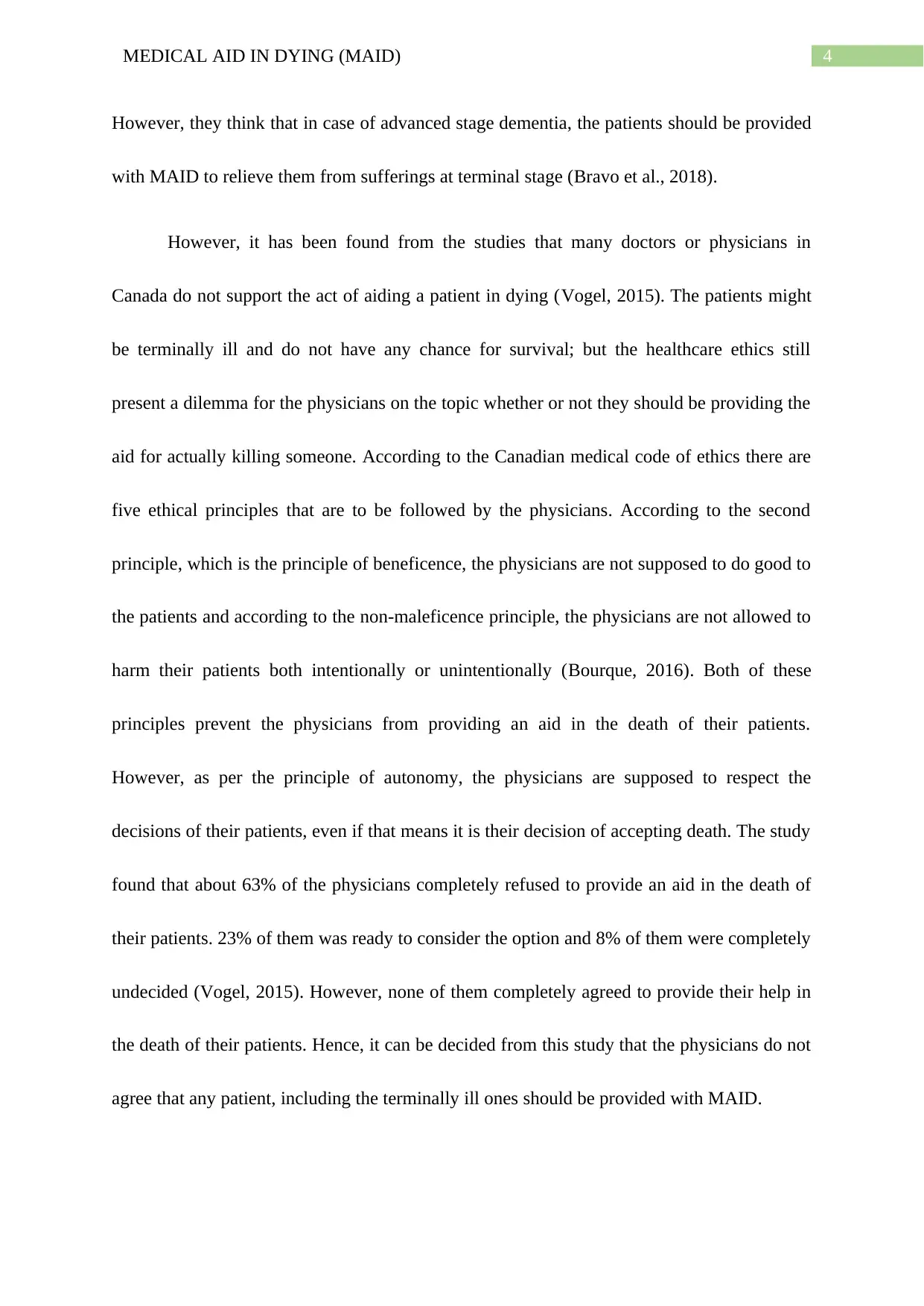
4MEDICAL AID IN DYING (MAID)
However, they think that in case of advanced stage dementia, the patients should be provided
with MAID to relieve them from sufferings at terminal stage (Bravo et al., 2018).
However, it has been found from the studies that many doctors or physicians in
Canada do not support the act of aiding a patient in dying (Vogel, 2015). The patients might
be terminally ill and do not have any chance for survival; but the healthcare ethics still
present a dilemma for the physicians on the topic whether or not they should be providing the
aid for actually killing someone. According to the Canadian medical code of ethics there are
five ethical principles that are to be followed by the physicians. According to the second
principle, which is the principle of beneficence, the physicians are not supposed to do good to
the patients and according to the non-maleficence principle, the physicians are not allowed to
harm their patients both intentionally or unintentionally (Bourque, 2016). Both of these
principles prevent the physicians from providing an aid in the death of their patients.
However, as per the principle of autonomy, the physicians are supposed to respect the
decisions of their patients, even if that means it is their decision of accepting death. The study
found that about 63% of the physicians completely refused to provide an aid in the death of
their patients. 23% of them was ready to consider the option and 8% of them were completely
undecided (Vogel, 2015). However, none of them completely agreed to provide their help in
the death of their patients. Hence, it can be decided from this study that the physicians do not
agree that any patient, including the terminally ill ones should be provided with MAID.
However, they think that in case of advanced stage dementia, the patients should be provided
with MAID to relieve them from sufferings at terminal stage (Bravo et al., 2018).
However, it has been found from the studies that many doctors or physicians in
Canada do not support the act of aiding a patient in dying (Vogel, 2015). The patients might
be terminally ill and do not have any chance for survival; but the healthcare ethics still
present a dilemma for the physicians on the topic whether or not they should be providing the
aid for actually killing someone. According to the Canadian medical code of ethics there are
five ethical principles that are to be followed by the physicians. According to the second
principle, which is the principle of beneficence, the physicians are not supposed to do good to
the patients and according to the non-maleficence principle, the physicians are not allowed to
harm their patients both intentionally or unintentionally (Bourque, 2016). Both of these
principles prevent the physicians from providing an aid in the death of their patients.
However, as per the principle of autonomy, the physicians are supposed to respect the
decisions of their patients, even if that means it is their decision of accepting death. The study
found that about 63% of the physicians completely refused to provide an aid in the death of
their patients. 23% of them was ready to consider the option and 8% of them were completely
undecided (Vogel, 2015). However, none of them completely agreed to provide their help in
the death of their patients. Hence, it can be decided from this study that the physicians do not
agree that any patient, including the terminally ill ones should be provided with MAID.
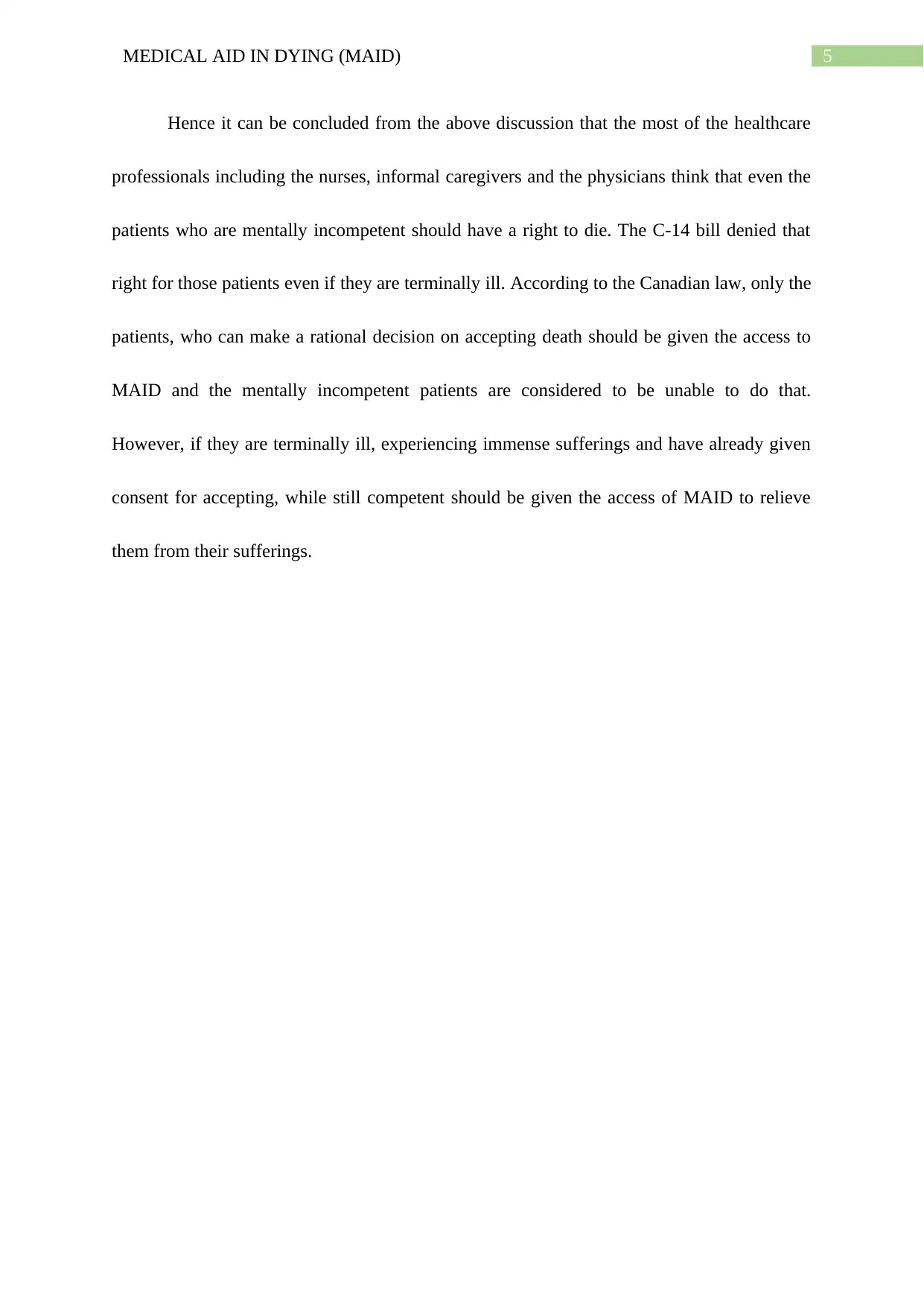
5MEDICAL AID IN DYING (MAID)
Hence it can be concluded from the above discussion that the most of the healthcare
professionals including the nurses, informal caregivers and the physicians think that even the
patients who are mentally incompetent should have a right to die. The C-14 bill denied that
right for those patients even if they are terminally ill. According to the Canadian law, only the
patients, who can make a rational decision on accepting death should be given the access to
MAID and the mentally incompetent patients are considered to be unable to do that.
However, if they are terminally ill, experiencing immense sufferings and have already given
consent for accepting, while still competent should be given the access of MAID to relieve
them from their sufferings.
Hence it can be concluded from the above discussion that the most of the healthcare
professionals including the nurses, informal caregivers and the physicians think that even the
patients who are mentally incompetent should have a right to die. The C-14 bill denied that
right for those patients even if they are terminally ill. According to the Canadian law, only the
patients, who can make a rational decision on accepting death should be given the access to
MAID and the mentally incompetent patients are considered to be unable to do that.
However, if they are terminally ill, experiencing immense sufferings and have already given
consent for accepting, while still competent should be given the access of MAID to relieve
them from their sufferings.
⊘ This is a preview!⊘
Do you want full access?
Subscribe today to unlock all pages.

Trusted by 1+ million students worldwide
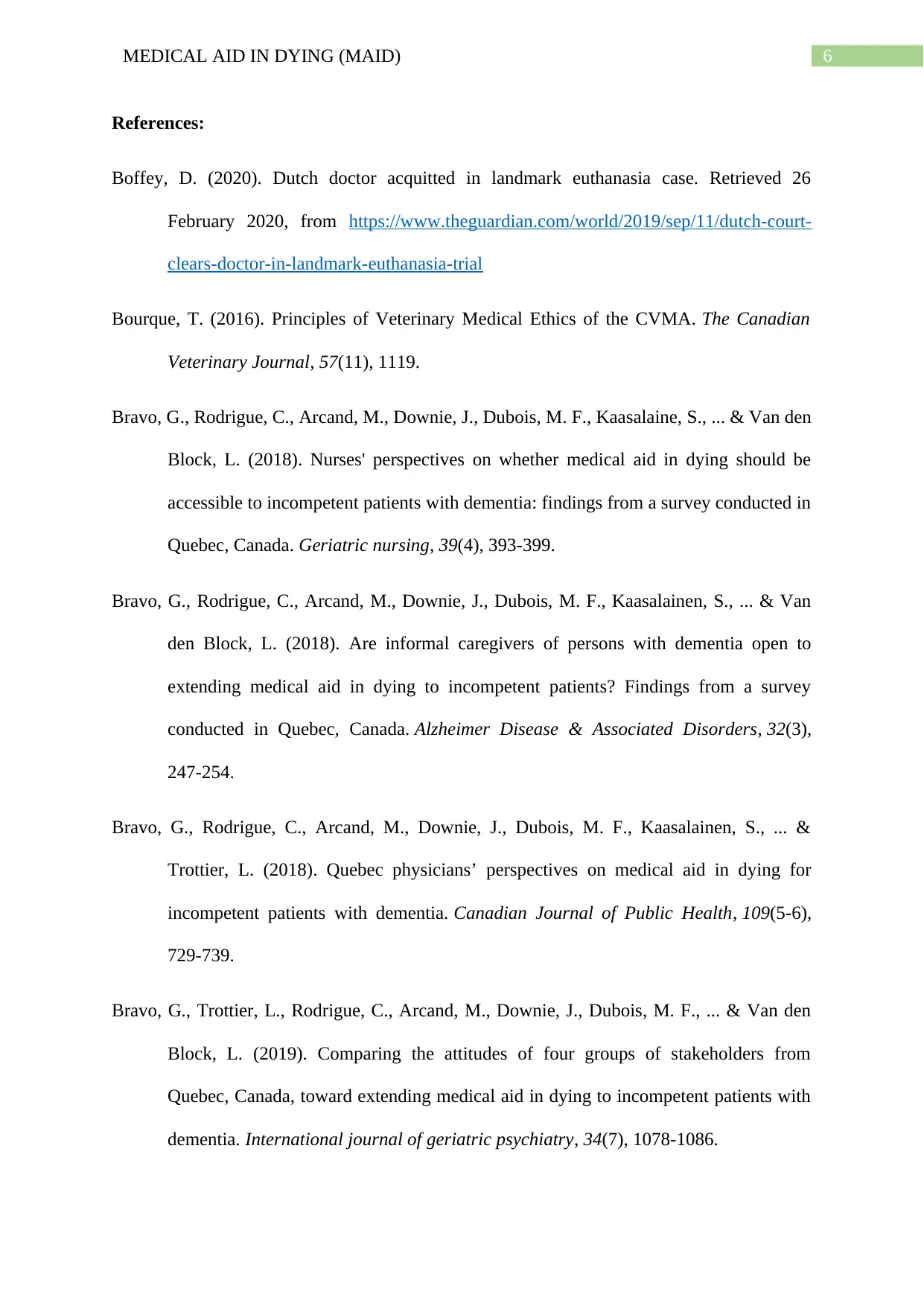
6MEDICAL AID IN DYING (MAID)
References:
Boffey, D. (2020). Dutch doctor acquitted in landmark euthanasia case. Retrieved 26
February 2020, from https://www.theguardian.com/world/2019/sep/11/dutch-court-
clears-doctor-in-landmark-euthanasia-trial
Bourque, T. (2016). Principles of Veterinary Medical Ethics of the CVMA. The Canadian
Veterinary Journal, 57(11), 1119.
Bravo, G., Rodrigue, C., Arcand, M., Downie, J., Dubois, M. F., Kaasalaine, S., ... & Van den
Block, L. (2018). Nurses' perspectives on whether medical aid in dying should be
accessible to incompetent patients with dementia: findings from a survey conducted in
Quebec, Canada. Geriatric nursing, 39(4), 393-399.
Bravo, G., Rodrigue, C., Arcand, M., Downie, J., Dubois, M. F., Kaasalainen, S., ... & Van
den Block, L. (2018). Are informal caregivers of persons with dementia open to
extending medical aid in dying to incompetent patients? Findings from a survey
conducted in Quebec, Canada. Alzheimer Disease & Associated Disorders, 32(3),
247-254.
Bravo, G., Rodrigue, C., Arcand, M., Downie, J., Dubois, M. F., Kaasalainen, S., ... &
Trottier, L. (2018). Quebec physicians’ perspectives on medical aid in dying for
incompetent patients with dementia. Canadian Journal of Public Health, 109(5-6),
729-739.
Bravo, G., Trottier, L., Rodrigue, C., Arcand, M., Downie, J., Dubois, M. F., ... & Van den
Block, L. (2019). Comparing the attitudes of four groups of stakeholders from
Quebec, Canada, toward extending medical aid in dying to incompetent patients with
dementia. International journal of geriatric psychiatry, 34(7), 1078-1086.
References:
Boffey, D. (2020). Dutch doctor acquitted in landmark euthanasia case. Retrieved 26
February 2020, from https://www.theguardian.com/world/2019/sep/11/dutch-court-
clears-doctor-in-landmark-euthanasia-trial
Bourque, T. (2016). Principles of Veterinary Medical Ethics of the CVMA. The Canadian
Veterinary Journal, 57(11), 1119.
Bravo, G., Rodrigue, C., Arcand, M., Downie, J., Dubois, M. F., Kaasalaine, S., ... & Van den
Block, L. (2018). Nurses' perspectives on whether medical aid in dying should be
accessible to incompetent patients with dementia: findings from a survey conducted in
Quebec, Canada. Geriatric nursing, 39(4), 393-399.
Bravo, G., Rodrigue, C., Arcand, M., Downie, J., Dubois, M. F., Kaasalainen, S., ... & Van
den Block, L. (2018). Are informal caregivers of persons with dementia open to
extending medical aid in dying to incompetent patients? Findings from a survey
conducted in Quebec, Canada. Alzheimer Disease & Associated Disorders, 32(3),
247-254.
Bravo, G., Rodrigue, C., Arcand, M., Downie, J., Dubois, M. F., Kaasalainen, S., ... &
Trottier, L. (2018). Quebec physicians’ perspectives on medical aid in dying for
incompetent patients with dementia. Canadian Journal of Public Health, 109(5-6),
729-739.
Bravo, G., Trottier, L., Rodrigue, C., Arcand, M., Downie, J., Dubois, M. F., ... & Van den
Block, L. (2019). Comparing the attitudes of four groups of stakeholders from
Quebec, Canada, toward extending medical aid in dying to incompetent patients with
dementia. International journal of geriatric psychiatry, 34(7), 1078-1086.
Paraphrase This Document
Need a fresh take? Get an instant paraphrase of this document with our AI Paraphraser
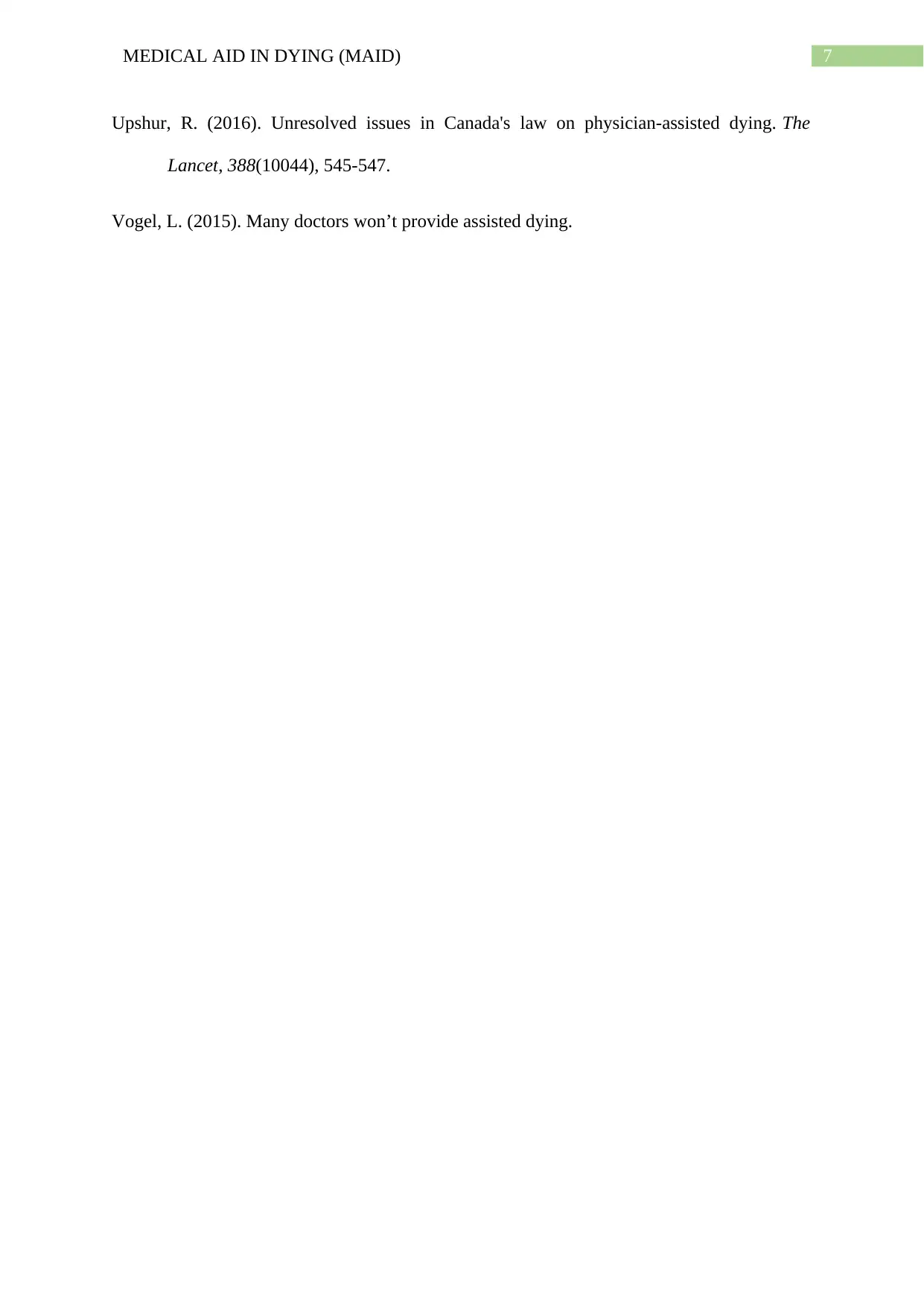
7MEDICAL AID IN DYING (MAID)
Upshur, R. (2016). Unresolved issues in Canada's law on physician-assisted dying. The
Lancet, 388(10044), 545-547.
Vogel, L. (2015). Many doctors won’t provide assisted dying.
Upshur, R. (2016). Unresolved issues in Canada's law on physician-assisted dying. The
Lancet, 388(10044), 545-547.
Vogel, L. (2015). Many doctors won’t provide assisted dying.
1 out of 8
Related Documents
Your All-in-One AI-Powered Toolkit for Academic Success.
+13062052269
info@desklib.com
Available 24*7 on WhatsApp / Email
![[object Object]](/_next/static/media/star-bottom.7253800d.svg)
Unlock your academic potential
Copyright © 2020–2025 A2Z Services. All Rights Reserved. Developed and managed by ZUCOL.





